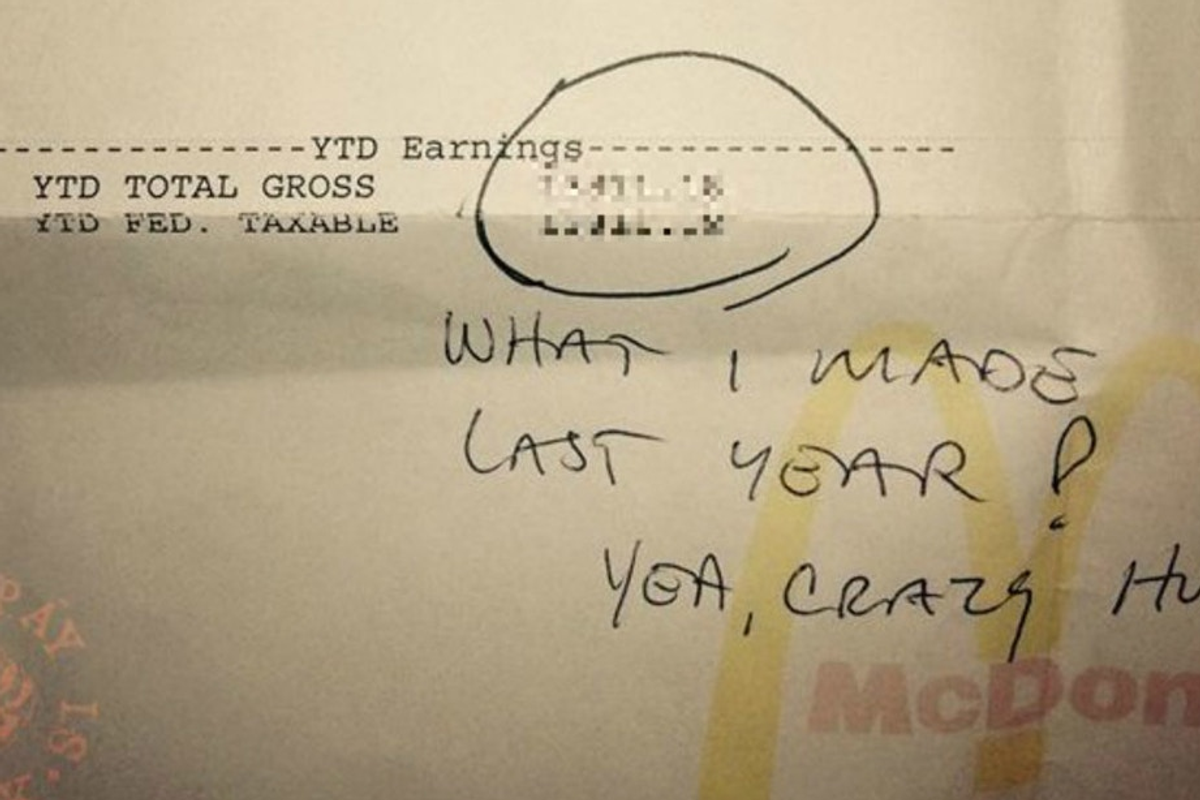Here’s a paycheck for a McDonald’s employee. And here's my jaw hitting the ground.
The federal minimum wage is still less than this.
How can anyone get by on this?
I've written extensively about minimum wage, supported by fact-checkers, economists, and scholarly studies. All of them support raising the minimum wage as a solution to lifting people out of poverty and getting them off public assistance. It's slowly happening, and there's much more to be done.
But when it comes right down to it, where the rubber meets the road is what it means for everyday workers who have to live with those wages. I honestly don't know how they do it. Ask yourself: Could I live on this small of an hourly wage? I know what my answer is.
(And note that the minimum wage in many parts of the county is STILL $7.25, so it could be even less than this).

The YouTube channel Just Frugal Me discussed the viral paycheck and noted there's absolutely nothing wrong with working at McDonald's. More than 2 million people in the U.S. alone work for the fast food giant. The worker's paycheck shows they put in 72 hours over the pay period, making $8.75 per hour. Before taxes, that's $631 for the week. Just Frugal Me's breakdown is even more eye-opening, breaking down this person's pay after taxes and weighing across average rent and utility costs. Spoiler Alert: the total costs for basic necessities far outweigh what this person is making even while working 12 hours per day. But they do make too much to qualify for Medicaid, meaning they will have to go out and buy their own health insurance.

Even in states like California, where the state's $20 minimum wage ensures that people earn nearly three times as much as the federal minimum wage, which remains as low as when this paycheck first made the rounds nearly 10 years ago.
Still, even for a worker that maxed out at 40 hours per week and took zero vacation or sick time, that's only a little over $41,000 per year. That's barely half the median wage in the state of $78,000 and far below a sustainable living wage in cities like Los Angeles.
- YouTubewww.youtube.com
The U.S. federal minimum wage is just $7.25 and hasn't been raised since 2009. In April 2025, the Raise the Wage Act of 2025 was introduced in the House of Representatives and U.S. Senate. The bill would increase the federal minimum wage to $17 an hour by 2030 and eliminate the subminimum wage for tipped workers and those with disabilities. But supporters should be cautious that it's unlikely to pass the Republican-controlled Congress.
If the Wage Act of 2025 were to pass, over $22 million workers would get a raise, which is 15% of the U.S. workforce. It would raise $70 billion for low-wage Americans, an increase of $3,200 per worker.
“No person working full-time in America should be living in poverty," Virginia Congressman Bobby Scott said in a statement. "The Raise the Wage Act will increase the pay and standard of living for nearly 22 million workers across this country. Raising the minimum wage is good for workers, good for business, and good for the economy. When we put money in the pockets of American workers, they will spend that money in their communities,”
This story originally appeared ten years ago. It has been updated to reflect new information.
- Teen opens his first paycheck from McDonald's and his reaction is so relatable ›
- Teen opens his first paycheck from McDonald's and his reaction is so relatable ›
- Here’s a paycheck for a McDonald’s worker. And here's my jaw dropping to the floor. ›
- "It's not what it used to be": Woman who makes $95k per year breaks down her take-home pay - Upworthy ›
- Bartender shares the whopping paycheck that makes his hour commute worth it - Upworthy ›
- A McDonald's employee shared their yearly 'bonus' package. The internet is calling it a new low. - Upworthy ›
- American visits McDonald's in China and is not prepared for how different the menu is - Upworthy ›

